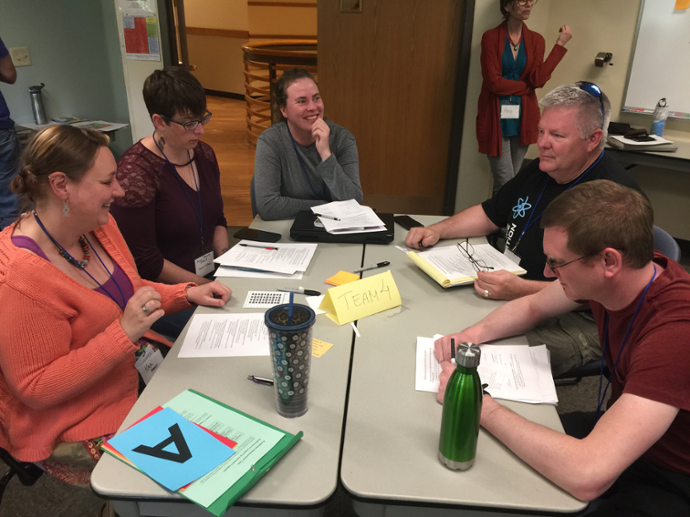LAMP Fellow of the Month (October, 2018)

Libby works with her team of educators at the 2018 Summer Institute.
Libby was immediately attracted to the philosophies of PBL and throughout the month of July she wrote a detailed instructional strategy proposing the use of PBL in the Discussion section of Genetics for which she was slated to be the graduate assistant. Libby was deeply motivated to change the style of instruction for the discussion because in her many teaching experiences she had observed that students were not retaining their genetics knowledge
from their coursework. Thus, Libby’s philosophy was to make genetics more personal and imperative through asking students to solve real life problems.
In her instructional strategy, Libby beatifully implemented backwards design. She
was guided by learning outcomes and the following large instructional goal, “Students
will be able to analyze real-world, human problems related to genetics and make an
informed decision or action. Students will demonstrate their recall of basic genetics
concepts and processes via higher-order analysis of problems.” For example, in order
to examine population genetics, students would be asked to decide how to manage hunting
of elk, given that overhunting could lead to decreased antler size, but under-hunting
may have negative consequences for local vegetation. Further, Libby created a table
in which she aligned the learning outcome with a corresponding assignment and assessment!
This careful alignment is generally only accomplished by advanced teaching and learning
practitioners.
Libby’s instructional strategy also elagantly attended to inclusion. She wrote, “I
plan to encourage students to think about how their decisions would change if they
came from a different place, time, or situation. I want to cultivate an environment
where students who are in a minority or represent a minority opinion feel safe enough
to explain their point of view. I plan to design the problem scenarios in a way that
there is no one clear-cut "correct" decision. I do want the students to think clearly
and carefully about scientific knowledge, and make evidence-based decisions, but the
problems are real-world and complicated enough that depending on the priorities or
ethical framework of the students, there are multiple reasonable decisions that can
be made.” This attention to standpoint and the welcoming of multiple solutions to
a problem are essential to welcoming underrepresented students into science.
After Libby submitted her instructional strategy in July, she was given the last-minute
option to become the instructor of record for one section of General Ecology. Libby
sprang into action. She took all of the work that she had done on the Genetics Discussion
instructional strategy and rolled it into her Ecology lesson planning. That is, while
content changed, she converted every Friday class session into a PBL activity. For
the content covered on Mondays and Wednesdays, she posed a real, imperative problem
for students to solve on Fridays. Libby knew that with a full class of 40 students,
she would need some help implementing these sessions. Thus, LAMP was able to fund
a Learning Assistant. Brett Ralston assists Libby in facilitating the students’ small
group discussions and problem-solving. Libby has served as an incredible mentor and
role model for Brett. He states, “Libby is very enthusiastic and cares a lot about
students. She always comes to class prepared; she is always willing to try new things
to help students get better on their exams. She now makes videos and study guides
based on students’ muddiest points.”
When Libby was asked what has changed for her since she arrived at the Summer Institute,
Libby said, “Thinking about PBL definitely changed my perspective on what I want my
students to learn and experience in the course. I am still committed to improving
scientific communication skills of my students and improving their confidence with
quantitative methods, but I emphasize values and philosophy much more than I would
have without LAMP.” To an educational developer, this quote is an inspiration because
unless we can connect with students at the level of values and philosophy, content
learning is unlikely to ‘stick’.
Libby has gone above and beyond the requirements of LAMP. She has joined the Scholarship
of Teaching and Learning (SoTL) Learning Community. In addition, she attends nearly
every session offered by the Ellbogen Center for Teaching and Learning (ECTL). Libby’s
passion for students is matched by her own passion for discovery, both extrinsic and
intrinsic. I will forever recall long conversations with Libby as she grappled with
the important questions, asking how she can facilitate students in making the hardest
connections, for example the link between their own behaviors and exponential population
growth. While Libby asks her students to go outside of their comfort zones, she challenges
herself to do the same. In this she has become an outstanding educator and we are
very lucky that she is a part of the LAMP Team! Congratulations Libby, we are proud
to award you the LAMP Fellow of the Month distinction!
~ Rachel Watson

